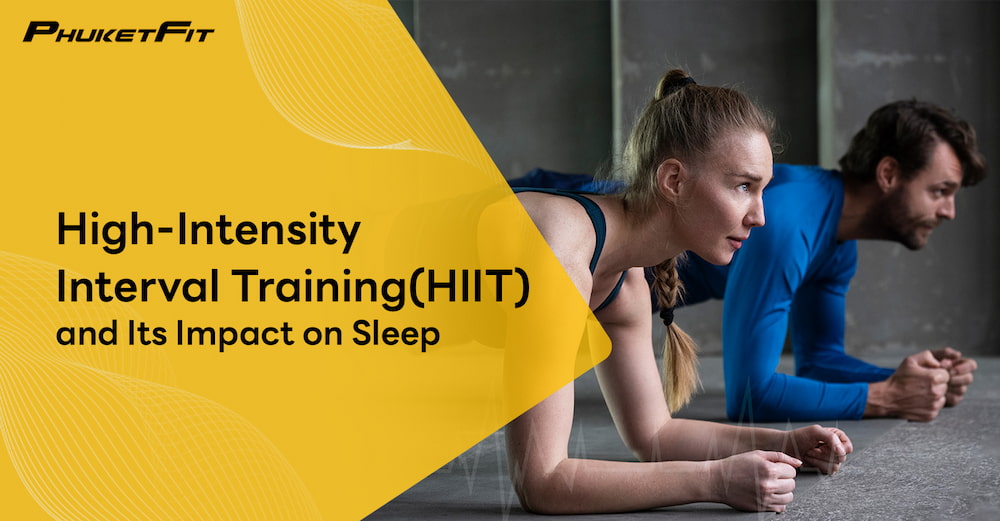
High-Intensity Interval Training(HIIT) and Its Impact on Sleep
In recent years, High-Intensity Interval Training, popularly known as HIIT, has taken the fitness world by storm. Its promise of delivering maximum benefits in minimal time has made it a go-to workout regimen for many. However, as more individuals embrace this fitness trend, concerns regarding its impact on sleep are beginning to surface.
Does the vigor of High-Intensity Interval Training (HIIT) disrupt your slumber, or could it actually be the key to a deeper, more restful sleep? Find out more as you read.
What is HIIT(High-Intensity Interval Training)?
HIIT comprises short bursts of intense exercise alternated with low-intensity recovery periods. The goal is to push your body to its limit during those high-intensity intervals, promoting cardiovascular fitness, enhanced muscle strength, and fat burning. A typical HIIT workout can range from 10 to 30 minutes, making it a time-efficient choice for many.
Beneficial for Diverse Populations
HIIT is a viable training modality that appears to be efficient and effective in diverse populations, including older, less active, overweight, and obese individuals, as well as patients with heart disease and type 2 diabetes. Overall, HIIT programs can produce significant benefits for the cardiovascular system and improved metabolic parameters.
Common HIIT Workouts:
- Burpees: A full-body workout that targets the chest, shoulders, triceps, quads, and hamstrings.
- Jumping Jacks: A great cardio exercise that also promotes flexibility.
- Mountain Climbers: Engages the core, shoulders, and hip flexors.
- High Knees: Elevates heart rate while working the lower body muscles.
The Science of Sleep
Importance of Sleep
Sleep is a cornerstone of good health. It’s the time when our bodies repair, grow, and rejuvenate. Adequate sleep is associated with a myriad of health benefits including improved memory, enhanced immune function, and better mood regulation.
Sleep Mechanics
Sleep is divided into several stages, each with its unique physiological changes:
- Stage 1 & 2: Light sleep stages where the body transitions from wakefulness to deeper sleep.
- Stage 3: Deep sleep stage which is crucial for feeling refreshed in the morning.
- REM Sleep: The stage associated with dreaming, memory consolidation, and learning.
The interplay between HIIT and Sleep
Research has dabbled into the relationship between HIIT and sleep, unveiling some intriguing insights.
A new study suggested that HIIT doesn’t hinder sleep, and may even help blunt appetite post-workout. Furthermore, the study unveils that individuals engaging in HIIT may experience a deeper sleep and find themselves feeling more refreshed the following morning, thus potentiating a beneficial cycle of exercise and restorative sleep.
Practical Applications of HIIT and Its Impact on Sleep
Timing HIIT Workouts:
The timing and intensity of High-Intensity Interval Training (HIIT) workouts can significantly influence one’s sleep quality, mood, and energy levels. Some individuals may find an early morning HIIT session to be invigorating, setting a positive tone for the day ahead, while others might prefer an evening workout to expend pent-up energy, aiding in better sleep.
A pivotal factor in this equation is the amount of time one spends with their heart rate in the 90 percent maximum zone during HIIT workouts each week. According to a survey, an optimal balance exists that can foster better sleep and a positive mood. The data reveals a sweet spot of 30-40 minutes per week spent in the 90-100 percent maximum heart rate training zone.
Striking a balanced approach in High-Intensity Interval Training (HIIT) is crucial as both falling short of, or exceeding the recommended intensity range, can lead to declined sleep quality and mood alterations due to high cortisol levels. It’s therefore advised to consult with a personal trainer, like those at PhuketFit, to tailor a HIIT regimen that aligns with your body’s response.
HIIT vs Other Exercise Regimens
Compared to Moderate-Intensity Continuous Training (MICT), like steady jogging or brisk walking, HIIT’s impact on sleep shows contrasting effects. While MICT is often recommended for better sleep, the intense nature of HIIT, especially close to bedtime, is sometimes met with skepticism.
A study from PubMed reveals that both MICT and stretching exercises may optimize sleep more effectively than HIIT, particularly in poor sleepers and the aging population. Experts advocate a balanced regimen of both HIIT and MICT, emphasizing the importance of tuning into one’s body to adjust workout intensity and timing for better sleep.
The following table presents a comparison of HIIT with other forms of workout and their respective impacts on sleep quality.
| Exercise Regimen | Impact on Sleep Onset | Impact on Sleep Duration | Impact on Sleep Quality | Notes |
| High-Intensity Interval Training (HIIT) | May vary | May vary | Potentially positive | HIIT may promote deeper sleep and morning workouts may be more beneficial. |
| Moderate-Intensity Continuous Training (MICT) | Generally positive | Generally positive | Generally positive | Steady exercises like jogging or brisk walking can be relaxing and promote better sleep. |
| Low-Impact Exercise (e.g., Yoga, Pilates) | Generally positive | Generally positive | Generally positive | Low-impact exercises often promote relaxation and can aid in sleep onset and quality. |
| Resistance Training (e.g., Weightlifting) | May vary | May vary | May vary | Timing of workouts and individual responses can lead to varying impacts on sleep. |
| Aerobic Exercise (e.g., Running, Cycling) | Generally positive | Generally positive | Generally positive | Regular aerobic exercise can help in falling asleep faster and enjoying more deep sleep. |
| Stretching / Flexibility Exercises | Generally positive | Generally positive | Generally positive | Stretching can be relaxing and aid in sleep onset and quality. |
Optimizing HIIT for Better Sleep
As previously discussed,tailoring your HIIT routine can potentially enhance sleep quality.
Begin with Lower Intensity:
For newcomers to High-Intensity Interval Training (HIIT), it’s advisable to start with lower intensity workouts like Circuit Training or Aqua HIIT at PhuketFit. This gradual approach helps condition your body while minimizing fatigue.
Progressive Intensification:
As you grow accustomed, progressively ramping up the intensity while integrating Strength & Conditioning, Muay Thai, or Yoga and Pilates can enhance fitness and potentially improve sleep. PhuketFit offers comprehensive programs for total fitness or weight loss to meet varied fitness goals.
Time Your Workouts Right:
Morning or early afternoon HIIT sessions can energize you for the day ahead.
Don’t Overdo It:
Overexertion can lead to sleep disturbances. Limit high-intensity workouts to 30-40 minutes.
Cool Down Properly:
A proper cool-down, including stretching or yoga, can transition your body to a state of relaxation. At PhuketFit, this holistic approach is emphasized, ensuring a balanced fitness regimen that caters to recovery as much as to active training.
Monitor Your Body’s Response:
Keep a sleep diary to track how different HIIT routines affect your sleep. Apps like Sleep Cycle can provide insightful sleep analytics.
Incorporate Relaxation Techniques:
Engage in mindfulness or meditation practices to calm the mind before bed. Platforms like Headspace offer guided relaxation techniques post-exercise.
Final thoughts
The interplay between High-Intensity Interval Training (HIIT) and sleep highlights the complex landscape of health and wellness. While HIIT offers the allure of time-efficient workouts, its nuanced impact on sleep necessitates a balanced approach. Embracing a blend of exercise intensities and tuning into one’s body responses can herald improved sleep and overall health.
